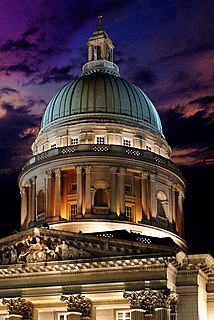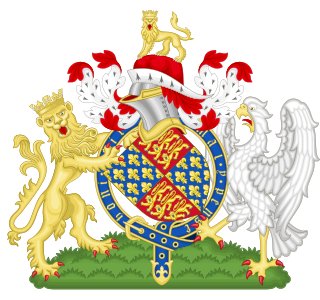Related Research Articles

English law is the common law legal system of England and Wales, comprising mainly criminal law and civil law, each branch having its own courts and procedures.
The court system of Canada forms the judicial branch of government, formally known as "The Queen on the Bench", which interprets the law and is made up of many courts differing in levels of legal superiority and separated by jurisdiction. Some of the courts are federal in nature, while others are provincial or territorial.

The legal system of Singapore is based on the English common law system. Major areas of law – particularly administrative law, contract law, equity and trust law, property law and tort law – are largely judge-made, though certain aspects have now been modified to some extent by statutes. However, other areas of law, such as criminal law, company law and family law, are almost completely statutory in nature.

The Treason Act 1351 is an Act of the Parliament of England which codified and curtailed the common law offence of treason. No new offences were created by the statute. It is one of the earliest English statutes still in force, although it has been very significantly amended. It was extended to Ireland in 1495 and to Scotland in 1708. The Act was passed at Westminster in the Hilary term of 1351, in the 25th year of the reign of Edward III and was entitled "A Declaration which Offences shall be adjudged Treason". It was passed to clarify precisely what was treason, as the definition under common law had been expanded rapidly by the courts until its scope was controversially wide. The Act was last used to prosecute William Joyce in 1945 for collaborating with Germany in World War II.

The Offences against the Person Act 1861 is an Act of the Parliament of the United Kingdom of Great Britain and Ireland. It consolidated provisions related to offences against the person from a number of earlier statutes into a single Act. For the most part these provisions were, according to the draftsman of the Act, incorporated with little or no variation in their phraseology. It is one of a group of Acts sometimes referred to as the Criminal Law Consolidation Acts 1861. It was passed with the object of simplifying the law. It is essentially a revised version of an earlier Consolidation Act, the Offences Against the Person Act 1828, incorporating subsequent statutes.
The law of Northern Ireland is the legal system of statute and common law operating in Northern Ireland since the partition of Ireland established Northern Ireland as a distinct jurisdiction in 1921. Prior to 1921, Northern Ireland was part of the same legal system as the rest of Ireland.

The Crimes Act 1961 is an Act of the Parliament of New Zealand that forms a leading part of the criminal law in New Zealand. It repeals the Crimes Act 1908, itself a successor of the Criminal Code Act 1893. Most crimes in New Zealand are created by the Crimes Act, but some are created elsewhere. All common law offences are abolished by section 9, as are all offences against Acts of the British Parliaments, but section 20 saves the old common law defences where they are not specifically altered.

The Short Titles Act 1896 is an Act of the Parliament of the United Kingdom. It replaces the Short Titles Act 1892.
Unlawful Oaths Act is a stock short title used for legislation in the United Kingdom and the Republic of Ireland relating to unlawful oaths.
Common law offences are crimes under English criminal law, the related criminal law of other Commonwealth countries, and under some U.S. State laws. They are offences under the common law, developed entirely by the law courts, having no specific basis in statute.

The Punishment of Offences Act 1837 was an Act of the Parliament of the United Kingdom of Great Britain and Ireland. It abolished the death penalty for a number of statutory offences and replaced it with transportation for life.
The Criminal Procedure Act 1853 is an Act of the Parliament of the United Kingdom. It makes provision for the giving of evidence by prisoners otherwise than at their own trial.

The Perjury Act 1911 is an Act of the Parliament of the United Kingdom. It creates the offence of perjury and a number of similar offences.

The Ecclesiastical Courts Jurisdiction Act 1860 is an Act of the Parliament of the United Kingdom. It is one of the Ecclesiastical Courts Acts 1787 to 1860. The Act is sometimes known as the "ECJA."

The judiciary of New Zealand is responsible for the system of courts that interprets and applies the laws of New Zealand. It has four primary functions: to provide a mechanism for dispute resolution; to deliver authoritative rulings on the meaning and application of legislation; to develop case law; and to uphold the rule of law, personal liberty and human rights. The judiciary is supported in its work by an executive department, the Ministry of Justice.
References
- "Alphabetical Table of Statutes". Current Law Statutes.
- "Alphabetical Table of Statutes, Measures, Orders, Etc". Halsbury's Statutes of England.
- "Alphabetical Table of Statutes and Rules Selected". Chitty's Statutes of Practical Utility.
- Craies and Hardcastle. "Popular or Short Titles of Statutes". Treatise on the Construction and Effect of Statute Law. 2nd Ed. 1892. p 604.
- "Alphabetical Table of Statutes". Juta's Statutes of South Africa.
- "Alphabetical Table of Statutes". The Statutes of New South Wales.
- "Alphabetical Table of Statutes". Statutes of Saskatchewan.